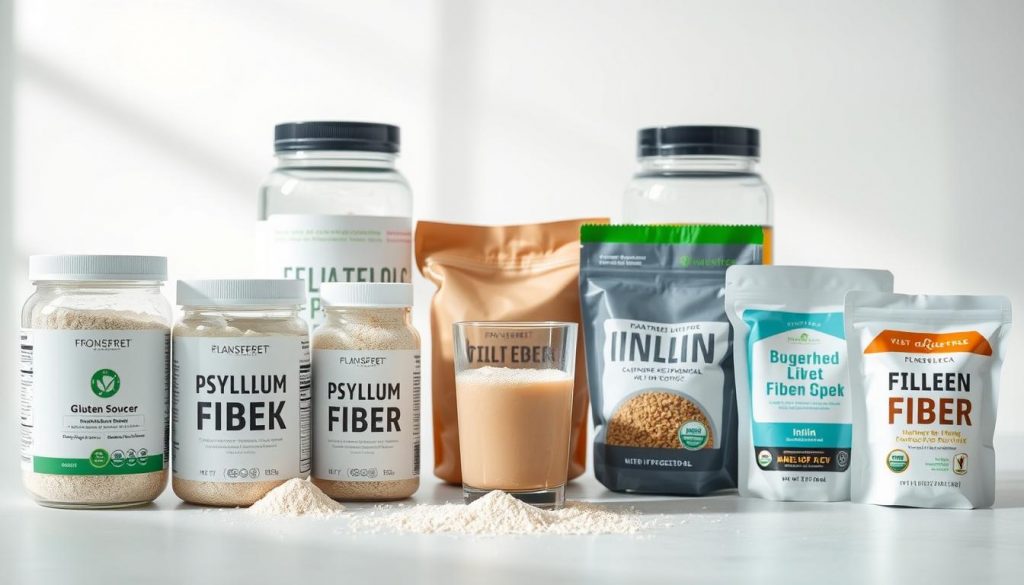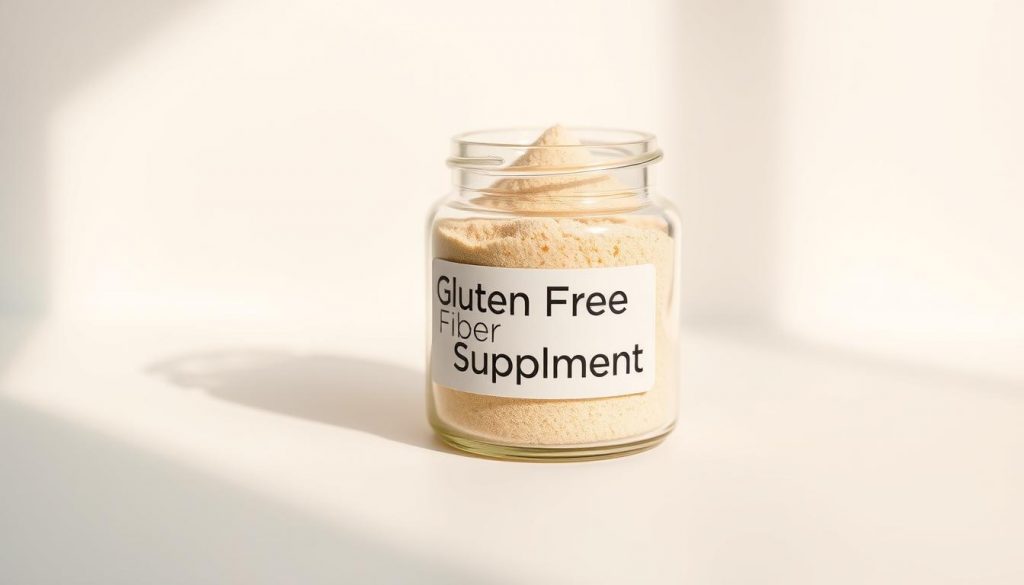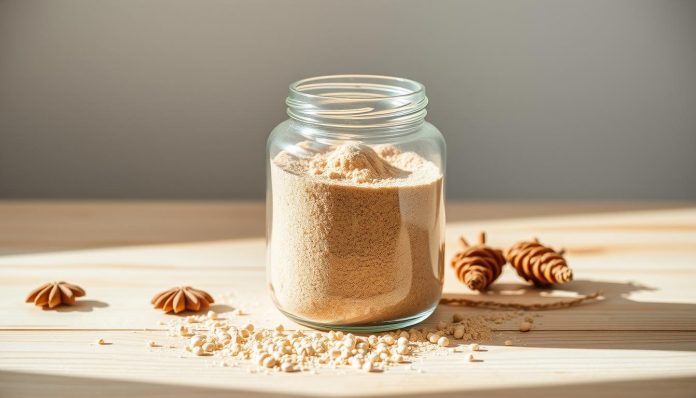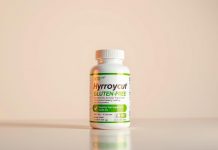Do you get enough fiber in your diet? Is your gluten-free fiber supplement right for your digestion? The average American eats about 10 to 17 grams of fiber daily. This is half of the 20 to 35 grams we should eat each day1.
With so many gluten-free fiber supplements out there, picking the best one can be tough. You need a supplement that boosts your digestive health and fills your fiber needs.
Table of Contents
Key Takeaways
- Gluten-free fiber supplements can help support digestive health and meet daily fiber needs.
- Natural fiber supplements are a great option for those looking for a gluten-free alternative.
- Gluten-free digestion support is key for those with gluten intolerance or sensitivity.
- Choosing the right gluten-free fiber supplement can be overwhelming, but with the right info, you can make a good choice.
- Gluten-free fiber supplements can help with regular bowel movements and reduce digestive issues.
- It’s important to think about the type of fiber, natural or synthetic, when picking a gluten-free fiber supplement.
When picking a gluten-free fiber supplement, think about how fiber helps your digestion. Look for soluble and insoluble fiber in the ingredients. With the right supplement, you can boost your digestive health and meet your fiber needs. Whether you’re after a natural supplement or something for gluten-free digestion support, you can find it.
What is a Gluten-Free Fiber Supplement?
A gluten-free fiber supplement is a dietary supplement that doesn’t have gluten. It’s great for people with gluten intolerance or celiac disease. It’s important to find a supplement with both soluble and insoluble fiber for a healthy digestive system2.
Soluble fiber turns into a gel in your gut, making stool softer and helping with bowel movements. Insoluble fiber adds bulk, helping food move through your system.
Choosing the right gluten-free fiber supplement is key. It should have both soluble and insoluble fiber for good digestive health. Adults need 25 to 30 grams of fiber daily3. Supplements can help meet this need, as most Americans only get about 17 grams a day2.
Understanding Fiber Types
Fiber is vital for your digestive health, but most Americans don’t get enough2. Soluble fiber is in oats, barley, and fruits. Insoluble fiber is in whole grains, veggies, and nuts.
Why Gluten-Free Matters
Gluten-free products are essential for those with gluten intolerance or celiac disease. They help with bloating, gas, stomach pain, diarrhea, and constipation. When picking a gluten-free fiber supplement, ensure it’s certified and has a mix of soluble and insoluble fiber. For more info, visit gluten-free diet pills for weight management.
Benefits of Fiber for Digestive Health
Fiber is key for good digestive health. A diet high in fiber offers many benefits, like helping with gluten free digestion. High fiber gluten free supplements can help you go to the bathroom regularly, avoiding constipation and diarrhea4. A diet full of top gluten free dietary fiber products also lowers the risk of digestive problems like diverticulitis and hemorrhoids.
Some main benefits of fiber for your digestive health are:
- Promoting regular bowel movements
- Reducing the risk of digestive disorders
- Lowering cholesterol levels
- Regulating blood sugar levels
High-fiber foods help keep your bowel movements regular, thanks to prebiotic fibers like inulin that feed good gut bacteria5. Soluble fiber, found in fruits, beans, and oats, can also lower LDL (bad) cholesterol, which is good for your heart5.
Adding fiber to your diet is easy, and it offers many health benefits. By choosing high fiber gluten free supplements and top gluten free dietary fiber products, you can get the nutrients you need for great digestive health.
| Fiber Type | Benefits |
|---|---|
| Soluble Fiber | Reduces LDL cholesterol, promotes cardiovascular health |
| Insoluble Fiber | Promotes regular bowel movements, prevents constipation |
Key Ingredients to Look For
When picking a gluten free fiber supplement, look for key ingredients that boost digestive health. Soluble fiber, like psyllium husk or guar gum, softens stool and helps with regular bowel movements6. Insoluble fiber, such as cellulose or hemicellulose, adds bulk to the digestive system. Natural fiber sources, like fruits, veggies, and whole grains, are better than synthetic ones7.
Some gluten free fiber supplements include flaxseed, a naturally gluten-free ingredient that’s both soluble and insoluble7. Inulin, or chicory root fiber, is also gluten-free but might cause digestive problems because it’s very fermentable7. It’s important to pick a supplement from natural sources and is gluten-free, like organic gluten free fiber options8.
When picking a natural fiber supplement, consider these points:
- Look for soluble fiber sources like psyllium husk or guar gum
- Choose insoluble fiber sources like cellulose or hemicellulose
- Opt for natural sources of fiber, such as fruits, vegetables, and whole grains
- Consider organic gluten free fiber options for a safer and more natural choice
By choosing a gluten free fiber supplement with the right ingredients, you can improve your digestive health and overall well-being6. Always talk to a healthcare professional before starting any new supplement, even if you have dietary restrictions8.
Popular Gluten-Free Fiber Supplements
Looking for a gluten free fiber supplement? There are many choices out there. Brands like Metamucil offer gluten-free options9. Sunfiber, made from guar gum, is another great choice1.
For those with gluten intolerance, gluten free gut health products are a big help. Psyllium husk powder, Ground flaxseed, and Chia seeds are popular picks. They can be mixed into food or taken as capsules, making it easy to boost fiber.
These supplements offer many benefits. They help with regular bowel movements, reduce digestive issues, and support gut health. When picking a best fiber supplement for gluten intolerance, look at the ingredients, dosage, and side effects. Always talk to a healthcare professional before adding new supplements to your diet.

Eating a balanced diet with whole foods is also key for fiber. But, for extra support, a gluten free fiber supplement can be a good choice. With so many options, it’s important to find a reputable brand that fits your needs10.
How to Choose the Right Supplement
Choosing the right gluten free fiber supplement is key. You need to think about your diet and health goals. Natural fiber supplements offer gluten free digestion support, which is vital for a healthy gut. About 16% of U.S. adults have constipation symptoms, and a high-fiber diet can help11.
Consider your personal needs and health when picking a supplement. If you’re gluten intolerant or sensitive, find a certified gluten free fiber supplement. A healthcare professional can also guide you, as suggested by12. They can suggest the right fiber amount and a suitable supplement for you.
Look at the supplement’s fiber type, serving amount, and extra ingredients for digestion. A mix of soluble and insoluble fiber supports digestion and bowel health, as13 points out. By carefully choosing a quality supplement, you can boost your health and well-being.
Dosage Recommendations
When taking a gluten free fiber supplement, following the recommended dosage is key. The daily fiber intake should be 20 to 35 grams14. Start with a low dose and gradually increase it as your body gets used to it, which is common with top gluten free dietary fiber products15.
Begin with 5 grams of fiber per day and add 5 grams every two weeks14. This helps your body adjust to more fiber and prevents digestive issues. Remember to drink plenty of water with fiber supplements to avoid constipation16.
General Guidelines
Choose a gluten free fiber supplement with a mix of soluble and insoluble fiber. Look for products with psyllium husk, ground flaxseeds, or chia seeds, which are great fiber sources15. Always follow the label’s dosage and adjust as needed for the best results.

Adjusting for Individual Needs
Remember, everyone’s needs are different, and dosage may vary based on age, sex, and health16. Children and older adults might need different amounts than adults. Always talk to a healthcare professional before starting any new supplement, even more so if you have health concerns14.
Incorporating Fiber Supplements into Your Diet
There are many ways to add fiber supplements to your diet. You can mix them into smoothies, baked goods, or yogurt17. This makes it simple to add them without big changes. For instance, you can put a gluten free fiber supplement in your morning smoothie or mix it into your favorite baked goods.
Exploring different natural fiber supplements and organic gluten free fiber options is a good start. Options like psyllium husk, acacia fiber, and chia seeds are popular. You can check out this guide to learn more about them and how to pick the best one for you.
Here are some tips for adding fiber supplements to your diet:
- Start with a small amount and gradually increase your intake to allow your body to adjust18.
- Choose a supplement that is made from natural fiber supplements and is certified gluten-free.
- Consider adding fiber supplements to your favorite recipes, such as smoothies or baked goods.
By following these tips and picking the right organic gluten free fiber options, you can easily add fiber supplements to your diet. This will help you enjoy the many health benefits they offer19.
Potential Side Effects to Consider
When you start taking a gluten free fiber supplement, it’s good to know about possible side effects. You might feel bloated or gassy at first20. This is because your body is getting used to more fiber. Start with a small dose and slowly increase it as your body adjusts.
It’s also important to watch out for allergies or sensitivities, if you’re prone to them21. If you get a rash or hives, stop taking it and talk to a doctor. Pick a high-quality gluten free fiber supplement that’s easy on your stomach.
Common Side Effects
- Bloating or gas
- Abdominal cramping
- Diarrhea or constipation
- Temporary weight gain
About 95% of people don’t get enough fiber every day20. A gluten free fiber supplement can help. But, knowing the possible side effects and how to avoid them is key. By picking a good supplement and following the right amount, you can help your digestive health.
When picking a gluten free fiber supplement, check the ingredients22. Look for ones that are certified gluten-free. This ensures you get a quality product that fits your diet. Always follow the dosage and talk to a doctor if you have any worries.
Comparing Brands: Gluten-Free Options
When picking a gluten-free fiber supplement, many brands are available. Metamucil, Sunfiber, Benefiber, Citrucel, and Fiber Choice are some well-known ones. They offer products that are gluten-free and come from natural sources, helping with digestion.
It’s important to look at the fiber type and amount in each brand. For instance, Metamucil has 6 grams of fiber per serving, with 5 grams being soluble1. Sunfiber gives 6 grams of soluble fiber per serving1. Benefiber has 3 grams of soluble dietary fiber in 2 teaspoons1. Always check for gluten-free or organic certifications to meet your dietary needs.
Price and value are also key factors. NOW Psyllium Husk Powder offers a lot of fiber at a low cost23. Garden of Life Raw Organic Fiber Powder might be pricier but has organic and non-GMO ingredients23.
Finding the right gluten-free fiber supplement depends on your needs and preferences. Always read labels and choose products from natural sources with the right fiber amount. This supports your gluten-free digestion needs with natural fiber supplements.
By considering these points and picking a quality gluten-free fiber supplement, you can boost your health. Enjoy the benefits of natural fiber supplements for gluten-free digestion support.
Personal Preferences and Fiber Sources
When picking a gluten free fiber supplement, what you like matters a lot. You might want something without flavor or with a light taste. Think about the form, like powder or capsule, to see if it fits your lifestyle.
Plant-based foods like chia seeds or flaxseed are great for fiber. They’re easy to add to your meals2.
Plant-Based Options
These foods are not just high in fiber but also packed with other nutrients. For instance, chia seeds give you 4.9 grams of fiber per tablespoon24. Ground flaxseed has 2.8 grams of fiber per tablespoon24.
Flavor and Texture Considerations
It’s important to think about taste and texture. Some supplements might taste or feel strong. Look for ones that are gluten-free and made from organic sources, like a gluten free prebiotic fiber supplement.
Here are some foods high in fiber to add to your diet:
- Chia seeds: 5 grams of fiber per 1 tablespoon2
- Ground flaxseed: 3.5 grams of fiber per 1 tablespoon2
- Cooked quinoa: 3.4 grams of fiber per 2/3 cup2
Start adding more fiber slowly to avoid stomach issues. Drink lots of water to help your digestive system work well24.
By picking a gluten free fiber supplement that suits you, you’ll get the fiber you need. This helps keep your digestive system healthy.
Conclusion: Finding Your Perfect Fiber Supplement
Finding the right25 gluten-free fiber supplement can change your digestive health. With many options, think about what you need and like. First, check if you get enough fiber – 95% of people don’t25.
Choose a supplement with gluten-free and organic certifications. Look at the fiber content and types, like psyllium25, which is good for your gut. Brands like Metamucil and Garden of Life have quality2526, gluten-free options for daily fiber.
The daily fiber you need depends on your age and gender, from 25-38 grams26. Start with a small dose and increase it slowly. The right2527 supplement can help your digestive system, keep you regular, and make you feel great.
FAQ
What is a gluten-free fiber supplement?
What are the different types of dietary fiber?
Why is it important to choose a gluten-free fiber supplement?
What are the benefits of fiber for digestive health?
What key ingredients should I look for in a gluten-free fiber supplement?
What are some popular gluten-free fiber supplement options?
How do I choose the right gluten-free fiber supplement?
What is the recommended daily intake of fiber?
What are some possible side effects of fiber supplements?
How do I compare gluten-free fiber supplement brands?
Source Links
- 7 Fiber Supplements That May Be OK If You’re Gluten-Free – https://www.verywellfit.com/gluten-free-fiber-supplements-562295
- Best Top Dietitian-Approved Gluten-Free Fiber Supplements – https://delectablefoodlife.com/best-top-dietitian-approved-gluten-free-fiber-supplements/
- Foods High in Gluten-Free Fiber – https://www.webmd.com/diet/foods-high-in-gluten-free-fiber
- Fiber supplements and clinically proven health benefits: How to recognize and recommend an effective fiber therapy – https://pmc.ncbi.nlm.nih.gov/articles/PMC5413815/
- Fabulous Fibre: The Benefits of Including More In Your Gluten Free Die Food Online Australia – https://www.gfnation.com.au/blogs/learning/fabulous-fibre-the-benefits-of-including-more-in-your-gluten-free-diet?srsltid=AfmBOoqMkH1KtKXOSe3lnpDtREjI28_nej7AXp0QDB3UoYP6wmAONV7m
- Girlboss – https://girlboss.com/a/blog/best-gluten-free-fiber-supplement?srsltid=AfmBOor3oAvQ_I4ojWUTVTlmSuw_QGB6snVqQmQWl93avt-9l1aGUCrw
- How To Tell If Your Fiber Supplement Is Gluten Free – https://www.utzy.com/blogs/health/gluten-free-fiber-supplement?srsltid=AfmBOopUBv3V14gSFF-YUYV0wiXH6trGWqp69WtQgH9Rh7u-XUaOrQ6A
- The Best Gluten-Free Fiber Supplements for Celiacs – http://celiact.com/blog/gluten-free-fiber-supplements/
- The Essential Guide to Gluten-Free Fiber Supplements – https://www.geneticnutrition.in/blogs/genetic-life/the-essential-guide-to-gluten-free-fiber-supplements?srsltid=AfmBOooSFZj6cQlTn6gMIHnm8a27j_0Si86B64nAMgpjfsNoH4LXBiPJ
- 8 best fiber supplements for constipation and health – https://www.medicalnewstoday.com/articles/best-fiber-supplements
- How Do You Choose the Best Fiber Supplement? – https://health.clevelandclinic.org/best-fiber-supplements
- Fiber Supplements Explained: Types, Benefits, and Risks – https://www.rupahealth.com/post/fiber-supplements-explained-types-uses-and-considerations
- Best Gluten-Free Fiber Supplement: Our Top Pick for 2025 – https://www.performancelab.com/blogs/prebiotic/best-gluten-free-fiber-supplement?srsltid=AfmBOoopd4-sab1zwvrKoDMXNVEXoGFcnN378DRhv0lNq5e9tkGTm4-8
- The Golden Rules of a High Fiber Diet – https://www.med.umich.edu/1libr/MBCP/HighFiberDietAdults.pdf
- The Essential Guide to Gluten-Free Fiber Supplements – https://www.geneticnutrition.in/blogs/genetic-life/the-essential-guide-to-gluten-free-fiber-supplements?srsltid=AfmBOopQH_A8K0Oz75SBBo6DYl6CF6FfwlzDzN1_xmFeqT6q6tiGqLr7
- Benefiber vs Metamucil: Benefits, side effects, and dosage – https://www.medicalnewstoday.com/articles/322538
- Gluten-Free Fiber Supplements – Tayler Silfverduk – http://tayler.silfverduk.us/gluten-free-fiber-supplements/
- What Happens to Your Body When You Take a Fiber Supplement – https://www.eatingwell.com/benefits-of-fiber-supplements-8420645
- The Essential Guide to Gluten-Free Fiber Supplements – https://www.geneticnutrition.in/blogs/genetic-life/the-essential-guide-to-gluten-free-fiber-supplements?srsltid=AfmBOoofb86zc4urEOqoE9REVvnqmYTZjFDormB-VXqCmsvff5YNKlwI
- How Much Fiber Is Too Much? Effects, Treatment, and More – https://www.healthline.com/health/food-nutrition/too-much-fiber
- Benefiber: Benefits, Side Effects, and Interactions – https://www.buzzrx.com/blog/benefiber-benefits-side-effects-and-interactions
- Gluten: A Benefit or Harm to the Body? – The Nutrition Source – https://nutritionsource.hsph.harvard.edu/gluten/
- You’re Probably Not Getting Enough Fiber. These Dietitian-Approved Picks Can Help. – https://www.goodhousekeeping.com/health-products/g43632266/best-fiber-supplements/
- Gluten-Free Fiber Supplements – Tayler Silfverduk – https://tayler.silfverduk.us/gluten-free-fiber-supplements/
- 9 Best Fiber Supplements, According To A Registered Dietitian (2025) | Garage Gym Reviews – https://www.garagegymreviews.com/best-fiber-supplement
- Health Benefits of Fiber Supplements – https://coopercomplete.com/blog/health-benefits-of-fiber/?srsltid=AfmBOoqkvyakCfS1HusCHNhd6tZGaaQMuZHNe7lZ04f1Dd0ocyxrEaf6
- Fibre supplements & IBS – https://www.monashfodmap.com/blog/fibre-supplements-ibs/












